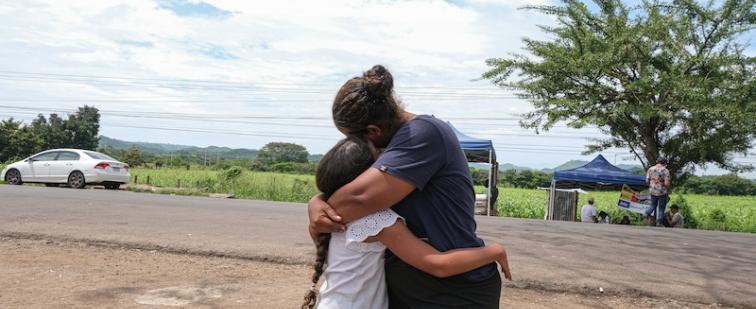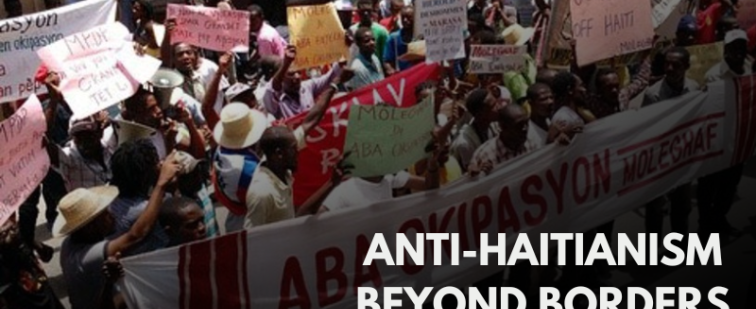Home
As Barack Obama meets Felipe Calderón, Mexico's drug war rages on. The current militarized strategy to the drug problem is abusing innocent civilians, dramatically increasing violence, and having very little effect on the flow of drugs toward the United States. A real solution to the problem would begin by attacking the economic roots of the problem: 25 years of failed economic policies and a renegotiation of NAFTA. The Mexican people need an economic solution, but instead they're suffering the consequences of a U.S.-backed military quagmire.
Barack Obama this week continues his administration's efforts to push the "reset" button on U.S. foreign relations attending the Summit of the Americas in Trinidad and Tobago. What if he had picked the Nation's Katrina vanden Heuvel or Democracy Now! anchor Amy Goodman to advise him at the upcoming Summit? Unlikely, to say the least, but 75 years ago President Franklin Delano Roosevelt did something just like that. As a result anti-imperialism saved the American empire.
A paper trail of declassified U.S. government documents helped confirm Fujimori's complicity in grave human right crimes committed during his ten years in office. His trial and conviction set a landmark historical precedent that will serve as a stark deterrent against future abuses, both in Peru and beyond. The case is also an important guidepost for upcoming justice-seeking efforts in Peru, where many criminals remain unpunished and the full extent of their deeds unknown.
After the immigration reform bill failed in 2007, the U.S. Immigration and Customs Enforcement (ICE) agency began actively promoting a largely dormant program that trains local law enforcement to perform the duties of federal immigration officers. As local communities increasingly become the front lines of the immigration war, one North Carolina county took on ICE along with local anti-immigrant groups—and won the battle.
The refusal to employ disabled people in Argentina has persisted for decades. Neither the political and economic orientation of those in government nor periods of economic expansion and job creation have favored the hiring of the disabled. Although the National Congress has passed a series of laws, including job quotas in 1981, an anti-discrimination law in 1988, and constitutional mandates on human rights in 1994, these norms are in practice rarely enforced.
As a special tribunal in Peru pronounced former president Alberto Fujimori guilty of human rights atrocities, the National Security Archive today posted key declassified U.S. documents that were submitted as evidence in the court proceedings. The declassified records contain intelligence gathered by U.S. officials from Peruvian sources on the secret creation of “assassination teams” as part of Fujimori’s counterterrorism operations, the role of the Peruvian security forces in atrocities and Fujimori’s participation in protecting the military from investigation.
As part of the "Not just Change, but Justice" campaign, a joint-effort by NACLA and the Latin America Solidarity Coalition, activist-scholar Lesley Gill reports on U.S. militarization in Latin America asking the question, "What are we facing today?" Though skeptical about change, she outlines why Obama needs to change Bush-era policies and end programs like Plan Colombia and Plan Mexico. Gill says that continued funding for both militarized anti-drug programs will embolden paramilitary groups and cause repression against activists.
Daniel Ortega’s presidency, the “second stage of the Sandinista Revolution,” as he called it, has been characterized by sectarianism, authoritarianism, and intolerance of dissidents. It therefore represents a profound betrayal of the original Sandinista movement, which was committed to popular democracy, openness, and pluralism.
As part of the "Not just Change, but Justice" campaign, a joint-effort by NACLA and the Latin America Solidarity Coalition, Father Roy Bourgeois, spoke at a recent panel in Washington D.C. Bourgeois, the founder of the School of the Americas Watch, spoke about Empire, the political sea-change taking place in Latin America, and the role of U.S.-based activists in changing Washington's foreign policy toward the region in the Obama era.
A special preview from the next NACLA Report, upcoming in May: After a month and a half of political deadlock, violent confrontations with police, and the death of a union militant, Guadeloupean activists reached a wide-ranging agreement with the French government. While the movement's grievances stemmed from the exorbitant living expenses in, they were firmly rooted in the French overseas territory’s history of economic exploitation and racial inequality. The movement’s success marks a new chapter of political and social activism in the French Antilles.












